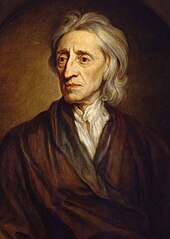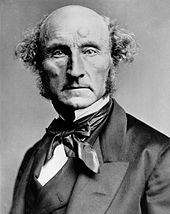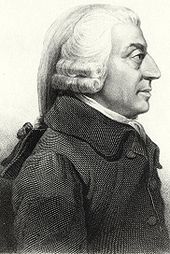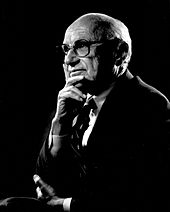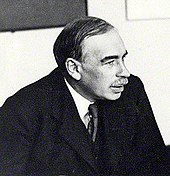liberalism
The liberalism (Latin liber, libera, libeum. "Free"; liberalis "the freedom concerning liberal") is a fundamental position of political philosophy and a historical and current movement which seeks a liberal political, economic and social order. Liberalism arose from the English revolutions of the 17th century. In many countries, national states and democratic systems emerged for the first time from liberal citizens' movements . Yellow is widely considered to be the political color of liberalism.
The main goal of liberalism is the freedom of the individual, primarily against state governmental authority; it is directed against state belief , collectivism , arbitrariness and the abuse of power or rule . In addition to conservatism and socialism , it is counted among the three great political ideologies or world views that emerged in Europe in the 18th and 19th centuries.
Political philosophy
Even if the term liberalism was first coined in Spain in 1812, its roots lie in the Enlightenment , from around 1650 onwards . The individual is at the center of liberalism as the basic position of political philosophy . According to liberal convictions, the individual freedom of the person is the basic norm of every human society, towards which the state should orient its political and economic order. In this context, freedom is primarily understood to mean the absence of any violence or coercion , especially on the part of the state. In a narrower sense of liberal positions, the role of the state is limited to the concrete protection of the freedom of individuals and the legal system that guarantees freedom.
Liberalism is in contrast to totalitarianism and in the modern western world is often considered a prerequisite for a modern, pluralistic democracy . To the present day, representatives of parties that are not explicitly liberal consider themselves liberals in the sense of the Enlightenment definition of liberalism. Liberalism established a justification for freeing oneself from old doctrines, which spoke out for the lack of freedom and legal inequality of the human being. Examples of such doctrines are feudalism , because it tied people to a liege lord, and absolutism , which allowed political power only to the king. In contrast to anarchism , liberalism does not reject the state, but sees the nation state as the guarantor of freedom and property. But there are quite different views of what he has to do to secure this and how far his tasks and rights should go.
The ancestors of Anglo-American liberalism are Hobbes and Locke . With Anglo-American liberalism, pragmatism , utilitarianism and empirical rationalism can hardly be separated. Strict morality and charitable solidarity , on the other hand, are a private matter for the liberal; they are in many ways associated with religions and local churches in the United States. In this respect, private communitarianism complements public liberalism. In the USA in particular, liberalism means: "Pragmatic freedom from and to: rule and dogmas, religion and morals, society and laws". The free sanctifies the contract, also as a social contract , among equals (peers). Checks and balances , i.e. the balance of power, form the power ethic of liberalism.
to form
“Liberalism” is a collective term for various political positions, whereby “what is common to all 'liberalisms' can only be brought into concrete, definitionally definable categories with difficulty.” However, various areas of society can be identified in which the demand for individual freedom is concretized . Common to the different approaches the high esteem individual freedom and personal responsibility . Everyone should live as they want, as long as they do not affect or violate the freedom of others. Democracy and the nation are seen as a means of protecting the freedom of citizens. Freedom of opinion, belief and conscience are viewed as a prerequisite for self-realization and self-development.
The liberal movement was heterogeneous from the beginning and was based on a broad spectrum of bourgeois demands for modernization against the state , church and society in almost all political, economic, social and ideological areas. Even in the early debates of the 19th century, in which the aim of replacing absolutist , restorative and autocratic forms of rule with participatory models based on the idea of popular sovereignty was in the foreground, moderate-liberal reformers competed with radical-liberal revolutionaries for the interpretative sovereignty of the liberal ones Weltanschauung and were in partly irreconcilable contradiction to one another. While the moderate liberalism the realization of the rights of freedom and the constitutional state in a constitutional monarchy regarded as sufficient political goal, the Democratic aimed radicalism to the complete conversion of polity and society and sought the replacement of the monarchy by the republic in an optionally newly created national state of .
After the realization of liberal constitutionalism , there was a crisis of liberalism at the end of the 19th century and, in some cases, increasingly after the First World War. The different assessment of the social question led to a split in liberalism into economic and social liberal approaches. As a reaction to the global economic crisis , a German neoliberalism developed , namely ordoliberalism , which sought to overcome the problems of so-called laissez-faire liberalism with recourse to the scholastic idea of a “natural, God-willed order”. At the end of the 20th century, especially in the USA, there was a revival of social-liberal political philosophy, initiated by John Rawls .
Constitutional liberalism
According to liberalism, the task of a constitution is to protect the natural rights of citizens from the omnipotence of the state. John Locke , one of the most important founders of liberalism, postulated in his work Two Treatises of Government , published in 1689, freedom, life and property as inalienable rights of every citizen. The rights to freedom, life and property are seen as fundamental human rights. The liberal constitution aims to protect these human rights from arbitrary interference by the state by limiting state power. These are to be protected in front of and by the state and also have priority over decisions made democratically.
John Stuart Mill put it in his essay On Liberty (dt .: On Liberty ) the principle that "the only reason for which mankind, individually or together, has the authority to interfere in the freedom of action of one of its members to protect themselves . That the only purpose for which one may lawfully use coercion against the will of a member of a civilized society: to prevent harm to others. "

These natural rights are protected by anchoring the separation of powers in the constitution in order to prevent the concentration of power. In addition to the horizontal separation of powers, the executive, legislative and judicial branches should be in balance and control each other ( checks and balances ) in order to prevent the accumulation of power and abuse of power in one of these areas. Charles de Montesquieu is considered to be the founder of the concept of the separation of powers with his book “Vom Geist der Gesetz”, published in 1748.
"As soon as the legislative power is combined with the executive in one and the same person or the same civil service, there is no freedom."
In the 19th century, German constitutional law , initially with Robert von Mohl , coined the concept of the liberal “ constitutional state ”. Compared to the “power state” of absolutism, state authority in the constitutional state is subject to self-binding due to the legality of administration, procedural guarantees and the possibility of effective legal protection. After the Second World War, this concept was supplemented by the aspect of the substantive rule of law: the validity of fundamental rights and the requirement of proportionality represent - in the sense of a substantive rule of law - an absolute limit to state activity and also directly bind the legislature.
Economic liberalism
Originally, "Liberalism" was reserved as a name for the political movement of liberalism. Since the beginning of the 20th century, the name has also been related to economic policy positions that were represented by classical economics and that can be traced back to Adam Smith . In contrast to other varieties of liberalism, we speak of economic liberalism. The foundations of economic liberalism are - following John Locke - private property and freedom of contract . Proponents of economic liberalism advocate free market economy and free trade in the tradition of classical economics .
In part, the property right is traced back to natural law justifications, as they can already be found in Hugo Grotius , Samuel Pufendorf and John Locke. The American founding fathers and, in the 20th century, the libertarian philosophers Robert Nozick and Ayn Rand , for example, argue in this tradition of justifying property rights under natural law, although their liberal orientation is sometimes contested. The property right is then traced back to an original act of appropriation through labor, according to Locke's property theory. Consequentialist arguments based on Adam Smith , Jeremy Bentham, and John Stuart Mill often come to a similarly strong emphasis on private property rights. But they justify this with incentives for efficient use, which lead to an increase in the common good. Unlike representatives of natural law, they do not justify property rights primarily with considerations of justice, but with considerations of utility. Representatives of this form of consequentialist (or utilitarian ) economic liberalism were the economists Ludwig von Mises , Friedrich Hayek , James M. Buchanan and Milton Friedman, as well as the legal theorist Richard Epstein .
Adam Smith traces the prosperity of the nations back in his work of the same name to the concept of the invisible hand , according to which the selfish striving of people contributes to the welfare of the whole society. Therefore, in the opinion of many economic liberals, free competition in the market economy is the optimal control instrument for the economy. Representatives of classical economic liberalism such as Jean Baptiste Say assumed that there would always be a market equilibrium without government intervention. Interventions by welfare state policies are seen as harmful. In the 19th century, influenced by the teachings of classical economics, the liberal model of a state whose tasks are primarily limited to the establishment of security and order and which intervenes as little as possible in economic processes (“ laissez-faire ”) applied in the 19th century . This conception of the state was criticized by Ferdinand Lassalle as a so-called " night watchman state ". However, after the global economic crisis, many economic liberals recognized that the free market can be threatened not only by state intervention, but also by oligopolies or cartel structures.
In response to the criticism of classical (economic) liberalism , new ideas developed, which were initially summarized under the term neoliberalism . In particular, the ordoliberalism of the “ Freiburg School ”, which is one of the main influences on the development of the social market economy , demanded a strong state that can counteract the legacy of the economy through regulatory policy . Market failure , for example in the case of so-called “ external effects ” such as environmental pollution , should, according to the liberal economic position, be overcome by means of instruments in line with the market, such as emissions trading .
One of the most important theorists of liberalism in the 20th century is the Nobel laureate in economics, Friedrich August von Hayek . Hayek, a prominent member of the Mont Pelerin Society , is regarded as a central figure of integration in economic liberalism not least because he influenced the development of three different economic schools in different phases of life. First, as a student of Ludwig von Mises, he developed the positions of the Austrian School a. a. played a decisive role in the criticism of economic accounting under socialism . In 1950 he went to Chicago, where it came with his participation to a reassessment of monopoly and cartel structures. Finally, in 1962 he was appointed to Freiburg, the center of German neoliberalism, where he worked out his ideas on the state “presumption of knowledge”, market-like “spontaneous orders” and “competition as a discovery process”.
The ideas of the Nobel laureate in economics, Milton Friedman , an advocate of free trade and deregulation, also had a strong influence in the second half of the 20th century on the development of the market and competition that could be observed in large parts of the world. Friedman, who is regarded as an important representative of the Chicago School of Economics, first took up ideas from continental European neoliberalism. Unlike the latter, however, like Hayek, he was also rather skeptical about regulatory competition control.
Since the term liberalism was associated with the political left in the USA after the New Deal and increasingly in the 1970s with the emergence of philosophical egalitarian liberalism ( left-wing liberalism ), economic liberal positions are often referred to as libertarianism .
Social Liberalism
While for economic liberals the dismantling of state and feudal rule is generally seen as sufficient to create equal opportunities, social liberals also want to compensate socially determined inequalities of opportunity. In order to minimize the restriction of individual autonomy, which is also undesirable by social liberals, help for self-help was propagated as a solution to the social question in the 19th century. So the social liberal Hermann Schulze-Delitzsch advocated the promotion of the cooperative system . Another typically liberal answer to the social question is qualification through a state-sponsored education policy . In the social market economy, representatives of ordoliberalism attempted to conceptually combine liberal economic positions with overcoming social problems.
Against the background of the global economic crisis, John Maynard Keynes tried - starting from a left-wing liberal political position - to make clear how anti-capitalist aspirations (communist and fascist) can be prevented by maintaining and expanding the capitalist welfare state . How Keynes understands liberalism is explained in the articles Am I a Liberal? from 1925 or The End of Laissez-Faire from 1926. Keynes sees full employment as a condition of the ability of the trade unions to have bargaining power. The increasing prosperity of the poorest is the optimal growth for the market-like economy and thus ensures individual independence.
In the egalitarian liberalism of John Rawls , equality of opportunity not only formal, but also substantially fair, has an important role. Rawls' theory of justice is considered a liberal conception because Rawls puts freedom over redistribution . Individual freedom should at best be restricted in order to protect the freedom of third parties, in no way for reasons of social justice . However, inequality is only justified if it also benefits the socially weakest in society.
Also in the liberal tradition since Immanuel Kant is the advocacy of freedoms as opportunities for realization , which Amartya Sen and Martha Nussbaum represent. However, with its positive concept of freedom , this approach is in tension with conventional forms of political liberalism. Isaiah Berlin and Charles Taylor have recently dealt with the positive and negative understanding of freedom and its significance for different approaches in liberal political philosophy .
History of liberal parties
When the precursors of the modern parties emerged in the 19th century , the liberal ones were part of it from the start. In contrast to the conservative, Catholic and gradually also socialist parties, liberal parties were mostly more loosely organized and could not build on a social foundation like the Catholic association system. However, the liberals benefited from unequal suffrage, as was the case in many European countries until the 20th century. The liberals could also prefer majority voting if this meant that their middle position served as a compromise candidate.
The introduction of general and proportional representation often meant a worse starting position for the liberals. In the UK, Germany and other countries, liberal parties lost a lot of ground in the 1920s. At times it was also party splintering that bothered the liberals, especially the left-wing liberals. Overall, however, liberal parties have parliamentary representation in almost all democracies and, along with the Christian Democrats, often belong to the classic governing parties.
The history of German liberalism is processed in the archive of liberalism of the Friedrich Naumann Foundation for Freedom in Gummersbach , which contains the documents of the FDP .
Liberalism and women's emancipation
Because of its advocacy of the individual's rights to freedom, liberalism has offered itself in history as an ally of the women's movement. In Germany, for example, a large part of the women's movement counted towards liberalism. The seminal work by John Stuart Mill The Subjection of Women (1869), in which he advocates equality for women, also contributed to this.
See also
- Old liberals
- National liberalism
- Manchester liberalism
- Keynesianism
- Austrian School (Vienna School, Austrian School for Marginal Utility, rarely: psychological school; Carl Menger, Eugen von Böhm-Bawerk)
- Liberal theology (Johann Salomo Semler; 1725–1791)
- Ultra-liberalism
literature
Classic of liberalism
- John Locke : Two Treatises on Government . Ed .: Walter Euchner (= Suhrkamp Taschenbuch Wissenschaft . Volume 213 ). Suhrkamp, Frankfurt am Main 1977, ISBN 978-3-518-27813-0 (British English: Two Treatises of Government . 1689. Translated by Hans Jörn Hoffmann).
- John Locke: A Letter on Tolerance . English-German . Ed .: Julius Ebbinghaus (= Philosophical Library . Volume 289 ). Meiner, Hamburg 1996, ISBN 978-3-7873-1143-9 (British English: A Letter Concerning Toleration . 1689. Translated by Julius Ebbinghaus).
- Charles-Louis de Montesquieu : On the Spirit of Laws (= Reclams Universal Library . Volume 8953 ). Reclam, Stuttgart 2011, ISBN 978-3-15-008953-8 (French: De L'esprit des Loix . 1748. Translated by Kurt Weigand).
- Adam Smith : Inquiry into the nature and causes of the wealth of nations . Ed .: Erich W. Streissler (= Uni-Taschenbücher . Volume 2655 ). Mohr Siebeck, Tübingen 2005, ISBN 3-8252-2655-7 (British English: An Inquiry to the Nature and Causes of the Wealth of Nations . 1776. Translated by Monika Streissler).
- Mary Wollstonecraft : Defending Women's Rights . Ed .: Ursula I. Meyer (= Philosophinnen . Volume 21 ). ein-FACH-verlag, Aachen 2008, ISBN 978-3-928089-48-7 (British English: A Vindication of the Rights of Woman. With Strictures on Political and Moral Subjects . 1792. Translated by Petra Altschuh-Riederer).
- Wilhelm von Humboldt : Ideas for an attempt to determine the limits of the effectiveness of the state (= Reclams Universal Library . Volume 1991 ). Reclam, Stuttgart 1978, ISBN 978-3-15-001991-7 (German: Ideas for an attempt to determine the limits of the effectiveness of the state . 1792.).
- John Stuart Mill : About Freedom . Ed .: Horst D. Brandt (= Philosophical Library . Volume 583 ). Meiner, Hamburg 2011, ISBN 978-3-7873-2194-0 (British English: On Liberty . 1859. Translated by Else Wentscher).
- Ludwig von Mises : Liberalism , 1927; online edition, Sankt Augustin, Academia 1993, ISBN 3-88345-428-1 PDF, 950 kB
- Milton Friedman : Capitalism and Freedom , Munich / Zurich, Piper 2003, ISBN 3-492-23962-5
-
Karl Popper : The open society and its enemies . Ed .: Hubert Kiesewetter (= collected works by Karl R. Popper in German . 5 and 6). Mohr Siebeck, Tübingen 2003 (English: The Open Society and Its Enemies . 1945.).
- The magic of Plato (= The open society and its enemies . Band 1 ). ISBN 3-16-148068-6 (English: The Spell of Plato .).
- False prophets. Hegel, Marx and the Consequences (= The Open Society and its Enemies . Volume 2 ). ISBN 3-16-148069-4 (English: Hegel and Marx .).
- Friedrich August von Hayek: The Road to Serfdom 1944, German: The way to bondage . Olzog, Munich 2007, ISBN 978-3-7892-8227-0
- Friedrich August von Hayek : The constitution of freedom . Ed .: Alfred Bosch, Reinhold Veit (= collected writings of Friedrich von Hayek in German . Volume 3 ). Mohr Siebeck, Tübingen 2005, ISBN 3-16-148628-5 (German: The constitution of freedom . 1960.).
- John Rawls : A theory of justice (= Suhrkamp-Taschenbuch Wissenschaft . Volume 271 ). Suhrkamp, Frankfurt am Main 1979, ISBN 978-3-518-27871-0 (American English: A Theory of Justice . 1971. Translated by Hermann Vetter).
- John Rawls: Political Liberalism (= Suhrkamp-Taschenbuch Wissenschaft . Volume 1642 ). Suhrkamp, Frankfurt am Main 2003, ISBN 978-3-518-29242-6 (American English: Political Liberalism . 1993. Translated by Wilfried Hinsch).
- Robert Nozick : Anarchy, State, Utopia . Olzog, Munich 2011, ISBN 978-3-7892-8099-3 (American English: Anarchy, State, and Utopia . 1974. Translated by Hermann Vetter).
precursor
- Thomas Hobbes : From the citizen . In: Hermann Klenner (Ed.): Elements of Philosophy III (= Philosophical Library ). tape 158 . Meiner, Hamburg, ISBN 978-3-7873-1166-8 , pp. 59–328 (Latin: De Cive . 1642. Translated by Jutta Schlösser).
- Thomas Hobbes: Leviathan . Ed .: Hermann Klenner (= Philosophical Library . Volume 491 ). Meiner, Hamburg 2004, ISBN 978-3-7873-1699-1 (British English: Leviathan or The Matter, Forme and Power of a Common Wealth Ecclesiasticall and Civil . 1651. Translated by Jutta Schlösser).
Other works
- Werner Becker : The freedom we mean. Decision for liberal democracy , Munich, Piper 1982, ISBN 3-492-02761-X .
- Klaus von Beyme : Liberalism. Theories of Liberalism and Radicalism in the Age of Ideologies 1789–1945 , Wiesbaden, Springer VS 2013, ISBN 978-3-658-03052-0 .
- Ralf Dahrendorf : The opportunities of the crisis. About the future of liberalism , dva, Stuttgart 1983, ISBN 3-421-06148-3 .
- Wolfgang Fach : The government of freedom , Frankfurt a. M., Suhrkamp 2003, ISBN 3-518-12334-3 .
- Karl-Hermann Flach : Another chance for the liberals or The future of freedom , Frankfurt a. M., Fischer 1971, ISBN 3-10-021001-8 .
- Edmund Fawcett: Liberalism. The Life of an Idea , Princeton / Oxford, Princeton University Press 2014, ISBN 978-0-691-15689-7 .
- Lothar Gall (Ed.): Liberalism , Königstein i. Ts., Athenaeum 1985, ISBN 3-7610-7255-4 .
- Anthony de Jasay : Liberalism revised. For a depoliticized society , Berlin, Propylaen 1995, ISBN 3-549-05494-7 .
- Arnd Küppers: "Christ set us free to be free." (Galatians 5: 1) On the relationship between Catholicism and political liberalism , ed. from the Catholic Social Science Center (Church and Society Green Series No. 458). JP Bachem Medien, Cologne 2019, ISBN 978-3-7616-3286-4 .
- Dieter Langewiesche : Liberalism in Germany , Frankfurt a. M., Suhrkamp, 1988, ISBN 3-518-11286-4
- Jörn Leonhard : Liberalism; On the historical semantics of a European pattern of interpretation , Oldenbourg, Munich 2001, ISBN 3-486-56533-8 .
- Domenico Losurdo : Freedom as a privilege. A counter-history of liberalism , Papyrossa, Cologne 2010, ISBN 978-3-89438-431-9 ( review )
- Axel Montenbruck : Idea of Human Dignity and Liberalism - Two Western Faiths , 3rd Edition, 2016, ISBN 978-3-946234-56-2 ( online on the website of the University Library of the Free University of Berlin.)
- Ralph Raico: The Party of Freedom - Studies on the History of German Liberalism , Lucius & Lucius, Stuttgart 1999, ISBN 3-8282-0042-7 ( PDF; 7.9 MB ).
- Helena Rosenblatt: The Lost History of Liberalism: From Ancient Rome to the twenty-first Century. Princeton University, Princeton 2018, ISBN 978-0-691-17070-1 .
- Guido de Ruggiero: History of Liberalism in Europe , Drei Masken Verlag, Munich 1930, Nachdr. Scientia, Aalen 1964.
- Samuel Salzborn (ed.): The state of liberalism. The liberal theory of the state by John Locke (= understanding of the state . Vol. 31). Nomos, Baden-Baden 2010, ISBN 978-3-8329-4500-8 .
- Gerhard Schwarz , Gerd Habermann , Claudia Aebersold Szalay (eds.): The idea of freedom. A library of 111 works of liberal intellectual history , Frankfurter Allgemeine Buch, Frankfurt a. M. 2006, ISBN 3-89981-136-4 .
- Rudolf Vierhaus : Liberalism . In: Basic historical concepts . Historical lexicon on political and social language in Germany . Vol. 3, Stuttgart, Ernst Klett 1982, ISBN 3-12-903870-1 , pp. 741-785.
- Rudolf Walter: Economic Liberalism . In: Basic historical concepts . Historical lexicon on political and social language in Germany . Vol. 3, Stuttgart, Ernst Klett 1982, ISBN 3-12-903870-1 , pp. 787-815.
Web links
- Link catalog on the topic of liberalism at curlie.org (formerly DMOZ )
- Gerald Gaus and Shane D. Courtland: Entry in Edward N. Zalta (Eds.): Stanford Encyclopedia of Philosophy .
- Article Liberalism at the Federal Agency for Civic Education
Individual evidence
- ^ Ralf Dahrendorf : Liberalism . In John Eatwell / Murray Milgate / Peter Newman (Eds.): The Invisible Hand . The New Palgrave Macmillan, London 1989, p. 183.
- ↑ Christoph Nonn: Bismarck: A Prussian and his century . CHBeck, Munich 2015, p. 123 ff. (Chapter: The English alternative)
- ↑ Sean Adams, Terry Lee Stones: Color Design Workbook: A Real World Guide to Using Color in Graphic Design . Quayside Publishing Group, Laguna Hills 2017, ISBN 978-1-63159-410-6 , pp. 86 .
- ^ Rohit Vishal Kumar, Radhika Joshi: Color, Color Everywhere: In Marketing Too . In: SCMS Journal of Indian Management . tape 3 , no. 4 , 2006, ISSN 0973-3167 , p. 40-46 ( ssrn.com [accessed June 20, 2019]).
- ↑ Axel Montenbruck : Human Dignity Idea and Liberalism - Two Western Faiths , 3rd Edition, 2016, 181 ff. ISBN 978-3-946234-56-2 ( online on the website of the University Library of the Free University of Berlin)
- ↑ Article “Liberalismus”, Willi Albers, Anton Zottmann (Ed.): Concise Dictionary of Economics : (HdWW), Vandenhoeck & Ruprecht, 1980, p. 33.
- ↑ Willi Albers: Art. "Liberalism." In: Willi Albers, Anton Zottmann: Manual dictionary of economics (HdWW), at the same time a new edition of the manual dictionary of social sciences , Vol. 5, Vandenhoeck & Ruprecht, 1980.
- ^ Gerhard Göhler: Answers to the social question - an introduction. In: Bernd Heidenreich: Political Theories of the 19th Century: Conservatism, Liberalism, Socialism . Akademie Verlag, 2002, pp. 417, 424.
- ↑ Eucken, quoted from Goldschmidt: Opening of the Contingency of Social Orders? Eucken and the Church as an ordering power. In: Pies, Martin Leschke: Walter Euckens Ordnungspolitik. Mohr Siebeck, 2002, ISBN 3-16-147919-X , p. 166 f.
- ^ Adamovich, Funk: General Administrative Law. Springer, 1987, p. 7.
- ↑ Thomas Nipperdey: German History: 1866-1918, Vol. 2: Power state before democracy. C. H. Beck, 1993, p. 182 ff.
- ↑ Rudolf Walther: Excursus: Economic Liberalism (article "Liberalism"). In: Brunner, Conze, Koselleck: Geschichtliche Grundbegriffe, Vol. 3, Stuttgart 1982. Page?
- ↑ On the political philosophy of libertarianism cf. S. Freeman: Illiberal Libertarians: Why Libertarianism Is Not a Liberal View . In: Philosophy and Public Affairs. Vol. 30, No. 2, 2001, pp. 105-151.
- ↑ Michael Goldhammer: Intellectual property and property theory: Reconstruction of the justification of ownership of intangible goods on the basis of the US-American property theory. Mohr Siebeck, 2012, ISBN 3-16-150993-5 .
- ↑ See the article Libertarianism . In: Internet Encyclopedia of Philosophy.
- ^ N. Wimmer, Th. Müller: Business Law: International - European - National. Springer, 2007, p. 19.
- ↑ Bernd Ziegler: History of Economic Thought: Paradigm Shift in Economics . Edition 2, Oldenbourg Wissenschaftsverlag 2008, ISBN 3-486-58522-3 , p. 128.
- ^ Paul Anthony Samuelson, William D. Nordhaus: Economics, the international standard work of macro and microeconomics. MI Wirtschaftsbuch 2007, ISBN 3-636-03112-0 , p. 72 f.
- ^ Karl-Peter Sommermann: State objectives and state objectives . Mohr Siebeck, 1997, p. 167.
- ↑ Frieder Neumann: Justice and Basic Income: A Justice Theoretical Analysis of Selected Basic Income Models . LIT Verlag, Münster 2009, ISBN 3-643-10040-X , p. 43.
- ↑ See Wolfgang Ayaß : Max Hirsch . Social liberal union leader and pioneer of adult education centers , Berlin 2013.
- ^ A b Gerhard Göhler: Answers to the social question - an introduction . In: Bernd Heidenreich: Political Theories of the 19th Century: Conservatism, Liberalism, Socialism . Akademie Verlag, 2002, pp. 417, 424.
- ↑ John Maynard Keynes: Am I a Liberal? In: Essays in Persuasion. WW Norton & Company, 1991, p. 312 ff.
- ↑ John Maynard Keynes: The End of Laissez-Faire . Hogarth Press, 1926
- ↑ Andrea Schlenker-Fischer: Democratic community despite ethnic difference: Theories, institutions and social dynamics , VS Verlag, 2009, p. 99.
- ^ Walter Reese-Schäfer : Political theory of the present in fifteen models Oldenbourg textbooks and handbooks of political science . Oldenbourg Wissenschaftsverlag, 2005, ISBN 3-486-57930-4 , p. 7.
- ^ Hans Joas, Wolfgang Knöbl: Social Theory: Twenty introductory lectures , Suhrkamp Verlag, 2004, p. 670.
- ↑ Nina Oelkers, Hans-Uwe Otto, Holger Ziegler: Capability to act and well-being . In: Otto, Ziegler (Hrsg.): Capabilities- Empowerment and Realization Chances in Educational Science , VS Verlag, 2009, p. 98 f.
- ↑ Erich Zalten: The intertwining problems of liberalism and communitarianism. Comments on political theory and ethics . In: Kurt Seelmann: Communitarianism versus Liberalism: Lectures at the conference of the Swiss section of the International Association for Legal and Social Philosophy on October 23 and 24, 1998 in Basel . Archive for Legal and Social Philosophy - Supplement No. 76, Franz Steiner Verlag 2000, pp. 85, 86.
- ↑ Angelika Schaser: Helene Lange and Gertrud Bäumer. A political community. Böhlau, Cologne 2010, p. 35 u. 133-147 et passim.
